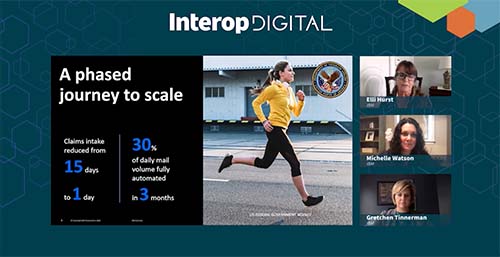The Definitive Guide to an Effective IT Automation Strategy
IT leaders are looking toward the future with a mix of inspiration and trepidation as they consider how they can further automate their enterprise technologies and processes and give their businesses a chance to catapult ahead competitively and become more agile. In this Interop event, we’ll explore the options available to IT leaders to better understand not only ways to automate, but also how to intelligently plan the strategy to avoid costly overruns and complexities in implementation. After all, winging it or automating piecemeal processes or departments without a careful and comprehensive plan can ironically lead to business slowdowns and soaring expenses.
IT automation is a broad, all-encompassing effort that involves networking, security, operations, business processes, cloud computing, software development, and so much more, so sifting through all the details and crafting a strategy that’s right for your business involves understanding all the parts and including the right stakeholders. Before embarking on your own IT automation effort, join us and our expert speakers to learn about the latest tools, best practices, and pitfalls to avoid.
Thank You to Our Sponsors
Keynote Sponsor:
Premier Sponsors:
Partners:
Get to Know Keynote Speaker Mark Settle
Mark Settle is a seven time CIO, three time CIO 100 award winner and two time book author. His most recent book is "Truth from the Valley, A Practical Primer on IT Management for the Next Decade". Settle serves on the advisory boards of several venture capital firms and multiple startup companies. Seven members of his prior management teams are currently sitting CIOs within publicly traded companies.
Agenda
Keynote | A Cohesive and Concise Approach to IT Automation in the Enterprise
Mark Settle, 7x CIO
Automation is an essential survival skill for every IT organization. IT will never be given the dollars or headcount required to adequately maintain legacy operations, implement new technologies and satisfy the never-ending demands of its customers. Automation practices need to be conceived and implemented as broadly as possible to reduce repetitive work, eliminate human errors, accelerate response times and improve employee productivity. This presentation provides practical advice on automating various aspects of infrastructure management, application support and service desk operations. It also addresses business process and work management automation opportunities that enable IT to provide greater value to its business partners.
Fireside Chat | The Five Stages of Automation
Learn how you can take a systematic approach to embedding and growing automation prowess within your organization.
Marshall Bartoszek, Orchestral.ai | Lenny Heymann, Interop
Tech Talk | True Network Visibility & Control with Auvik
Tools and Strategies for Orchestrating and Automating IT and Security Operations Sponsored by Netenrich
Chris Morales, Netenrich | Chris Crowley, Montance | Eric Parizo, Omdia
Moderator: Joan Goodchild, Dark Reading
Today's security operations teams are exploring new frameworks and technologies for connecting and correlating security tools and data. Whether it's Security Orchestration, Automation, and Response (SOAR), Extended Detection and Recovery (XDR), or other technologies and practices, security teams are rethinking and reframing the way they handle defense and incident response. But how will these new directions impact the broader IT organization? In this panel discussion, experts will discuss some of the latest trends in security operations, and their potential impact on IT operations.
Tech Talk | Orchestral.ai: Introducing AI-Driven Autonomous Infrastructure
Reimagining Workflow When Automating Your Enterprise Sponsored by Bizagi
Rachel Brennan, Bizagi | Cassandra Mooshian, Omdia | Scott Howitt, McAfee | Nick Colisto, Avery Dennison
Moderator: Brad Shimmin, Omdia
As companies are challenged more and more by customers to meet their growing demands for products and services, they have to be able to adjust their operations and processes on the fly. That means not only speeding up the efforts, but also rethinking your current approach to workflow and workflow management. With more companies turning to automation and digital transformation, they’re discovering that their current workflow systems and processes may not align with their future business needs. In this session, our expert speakers will discuss how to reimagine workflow so it fits a more agile environment enabled by automation. We’ll address how to plan for this transformation, how to address it with minimal disruption, and how to set up management and monitoring to optimize outcomes.
Tech Talk | Camunda Platform Quick Look
Automating DevOps for Accelerating Software Delivery Sponsored by Infoblox
Glenn Sullivan, Infoblox | Cheryl Razzell, Polystream
Moderator: Jayne Groll, DevOps Institute
The DevOps process was created to speed delivery of software by combining the efforts of the development staff with the needs of operations to eliminate redundant work. But it didn’t automatically eliminate all redundancies. By automating much of the DevOps processes, IT leaders are now able to squeeze out even more of the costly and time-consuming efforts to both speed up the business and reduce the impact on the budget. In this session, our expert speakers will discuss how companies can add automation technologies and processes to the DevOps effort without having to disrupt current methodologies or retrain workers. We’ll address the challenges of inserting automation into legacy approaches and offer new ideas for helping your dev teams to handle even more projects.
Tech Talk | Chatsworth Products’ (CPI) RMR® Industrial Enclosures: Providing Reliable Equipment Support and Protection for Your IT Automation Infrastructure
The Role of AIOps in Adopting a Hybrid and Multi-Cloud Strategy
Roy Illsley, Omdia
The rise of AIOps presents the opportunity to unify visibility and management across teams, operations, and technology stacks – a need that is growing commensurately with migration to the cloud. According to Omdia, 35 percent of enterprise workloads are currently executing in a cloud environment, an increase from 20 percent in 2018. While many enterprises now have cloud strategies, migrating to the cloud successfully requires a new approach to operational management. The increased complexity of hybrid and multi-cloud environments can reinforce existing siloes across people, operations and technologies. Therefore, the need for unified visibility and management approach across teams and technology stacks has never been more important. The rise of AIOps has enormous potential to connect contextualized information across siloed teams and technology and, where possible, to automate operations. During this session, we will examine how AIOps can help address key operational management challenges that exist in a hybrid and multi-cloud world.
Business Drivers for Network Automation
Troy Whitney, Network to Code
The benefits of network automation go well beyond the technology itself. A comprehensive network automation framework can help you address a wide range of strategic business challenges. These include rapid response to business requests, boosting reliability and availability of services, reduced maintenance costs, and even increased business innovation. In this session you’ll learn how to associate investments in network automation with these and other business benefits to help you secure funding for new initiatives and document the return on investment with key performance indicators.
Developing a Culture for Network Automation
Michael Bushong, Juniper Networks | Ivan Pepelnjak, IPSpace | Joe Eldridge, Riot Games
Moderator: Bryan Culver, Network to Code
For network automation to succeed you need the right code, and the right culture. Network automation, and automation more generally, is not a light switch but a culture: a culture defined by how both business and engineering look for novel solutions to problems, inefficiencies and value gains. Our panelists will explain how they developed a culture for network automation, discuss past-experiences, as well as how to identify and apply best-practices to organizations in all phases of their automation journey. These mindsets and thought models apply to networks of all sizes, entirely virtual, legacy, and small business to enterprise.
Network Automation with Open Source, Commercial and Custom Software
Doug Gourlay, Arista Networks | Samir Parikh, Intentionet | Michael Wynston, Fiserv
Moderator: Brett Lykins, Network to Code
The network automation landscape can often be confusing when evaluating how to use software to solve the problems in your network. There are Open Source, Commercial, and Custom software solutions, and understanding what niches they fill, and how they can interact to solve your problems can often be overwhelming. This panel will dive into some common use cases for each category of software and will talk about how to evaluate these solutions based on their appropriateness for your environment and architecture. We will also talk about ways to bring these disparate tools and categories of tools together into an overall network automation framework.
We partner with (ISC)² to provide credits for Interop. 1 credit is awarded per one hour of security-themed sessions attended, with a maximum of 8 per day. CISSP certification is a globally recognized standard of achievement that confirms an individual's knowledge in the field of information security.
It’s simple: enter your (ISC)² member number on the Interop registration profile page. If you have already registered for Interop you can log back in to your profile and add it. Following the live event on June 15, Interop will submit your security-themed session attendance to (ISC)² so the credits can be added directly to your account. Any on-demand activity will need to be self-submitted. If you need to add your (ISC)² number to your profile, send an email to [email protected].
All educational opportunities offered by the submitter as eligible for CPE credits shall be of the highest quality, directly related to at least one (1) domain of information security as recognized by (ISC)².







